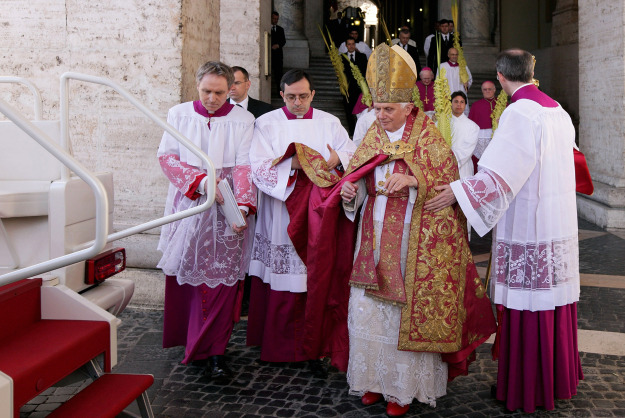By David Rothkopf
Foreign Policy
March 29, 2010
http://rothkopf.foreignpolicy.com/posts/2010/03/29/is_the_vatican_scandal_really_about_the_abuse_of_power
 |
This weekend the Pope took a hard stand on behalf of the power of faith to provide "the courage" to not allow "oneself to be intimidated by the petty gossip of dominant opinion." This revealed more about the Pontiff's misunderstanding of the current crisis in the Church than intended. Because, of course, the problem is not the petty gossip. The problem is the hard and awful fact of decades of abuse of thousands upon thousands of innocent children at the hands of priests in whom they and their families had placed the ultimate trust.
The problem is not petty gossip. The problem is what would be considered in any other organization to be a apparent conspiracy to cover up grievous crimes and to recklessly endanger innocents. The problem is a culture not of compassion but of one that placed the interests of a rich and powerful organization above those of the individuals it was supposed to be serving. The Church doesn't need to be protected. The children need to be protected.
No, the problem is not petty gossip. The problem is the Pope and the church hierarchy of which he is not only the head, but also a revealing symptom. He may well be a moral and deeply spiritual man. But over decades, while some in the church have succumbed to temptations of the flesh, the Pope and other leaders may have fallen just as damagingly to those associated with power. They have been corrupted by it and in turn they have corrupted an organization that exists only through the moral authority they systematically compromised. As a result, the Church faces one of its greatest crises of the modern era.
Yes, as his clueless and increasingly desperate sounding defenders have argued, the Pope may not have been aware of the final disposition of the case of Reverend Lawrence Murphy, abuser of 200 deaf boys in the United States, but surely in an organization that now appears to have been so rife with such cases, he could not possibly have been unaware of scores of cases like it. But he like other Popes, like Ireland's Cardinal Brady, like the two Irish bishops who have resigned, like countless others among their colleagues have at best shown indifference to what was happening to their parishioners or to the organization whose core values they were undercutting indirectly or otherwise.
New York's Archbishop Timothy Dolan even went so far as to compare the Pope to Jesus Christ in that both faced unjust accusations. It was a deeply flawed comparison on countless levels. But perhaps there is a useful if inadvertent message in it. Jesus is revered especially during this week of the year for his sacrifice on behalf of humanity. If the Pope emulates him and his message, perhaps he might consider the benefits that might come of some personal sacrifice of his own.
In any other organization facing such a pervasive and long-standing cultural crisis, it would be almost reflexive to consider a management change. That said, in the case of an organization which is in the moral authority business, if a leader were actually seen as a symbol of a culture that threatened the very foundation on which the enterprise depended, there would be no choice but to replace him and demonstrate that core values and the interests of the community served was much larger than the interests of any individual or small group of leaders.
It is time for a house cleaning in the Vatican. Every dithering, defensive, inadequate apology, every fumble for an explanation, every attempt at minimization of the problem, every failure to act sweepingly and in the interests of victims rather than perpetrators, every such step makes that all the clearer. Pope Benedict may be a good man, but ironically the measure of his greatness may be whether he has the courage to set his own interests aside in favor of the much greater needs of the Church he has been chosen to lead.
Any original material on these pages is copyright © BishopAccountability.org 2004. Reproduce freely with attribution.